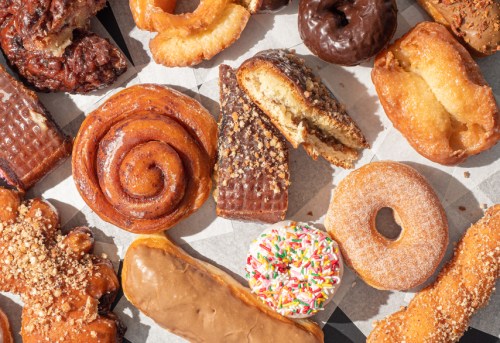Our editors independently select these products. Making a purchase through our links may earn Well+Good a commission
Feeling a little down in the dumps? If so, Maggie Berghoff, a functional medicine nurse practitioner and author of Eat to Treat, is holding space for you. To that end, the expert says that there are foods and beverages that can boost your mood or dampen it, and recommends being mindful of the food-mood connection by leaning into those that spark joy.
Experts in This Article
a functional medicine nurse practitioner and author of USA Today Bestseller, Eat to Treat
Berghoff says there are four main food and drink categories that can impact mood levels in both directions. But before you go bonkers at the supermarket or clear out anything in your pantry, know that you shouldn’t overthink any of the above—nutrients are just one piece of the mental health puzzle, and anyone experiencing feelings of depression or anxiety should see a licenced physician ASAP. “I always encourage people to have a positive mindset around food because it’s truly amazing once you know how to nourish your body and mind with everyday foods,” Berghoff says.
Ahead, she shares foods that improve mood and those that can dampen it, according to science.
4 mood-boosting foods and drinks to maintain the pep in your step
1. Foods rich in omega-3 fatty acids
According to Berghoff, some of the best mood-stabilizing foods contain high levels of omega-3s—think salmon, nuts, and seeds. “Omega-3s are anti-inflammatory, and since we know inflammation in the brain can increase risk of anxiety and depression, consuming foods rich in this nutrient can help mitigate the risk of these disorders and even improve your mood,” Berghoff says.
Additionally, she notes that omega-3s also support the function of neurotransmitters linked to mood regulation, including serotonin and dopamine, which can also improve your body’s stress response and help keep your mood stable. “For all these reasons, I always have nuts and seeds on hand for easy snacking, especially during the work week,” Berghoff says.
2. Dark chocolate
Chocolate lovers, sweet news: It’s one of Berghoff’s favorite mood-boosting foods. “When consumed in moderation, dark chocolate has been shown to act as a mood-booster because it contains magnesium, a mineral that can help reduce stress and anxiety, and flavonoids, a plant compound that can help increase blood flow to your brain and improve mood and cognitive function,” she says.
3. Matcha
Matcha is rich in anti-inflammatory antioxidants that can help moderate mood. “Fun fact: Matcha is 17 times more antioxidant-rich than blueberries,” Berghoff says. Not that we’re counting. “Since chronic inflammation is associated with mood disorders, increasing your matcha intake can actually have a positive effect on your mood.” Plus, it contains high levels of L-theanine and provides a natural energy boost, minus the crash you’re more likely to experience when consuming coffee.
4. Fermented foods
There’s strong evidence that a healthy gut can help stabilize mood levels, says Berghoff. As such, she recommends adding fermented foods to your daily routine. “Research shows that 95 percent of serotonin, which is a mood stabilizer, is produced in the gut,” Berghofff says. In short, a healthy gut consists of greater levels of serotonin, and more serotonin means a stabler mood. Berghoff’s go-to fermented foods include kimchi, sauerkraut, and kombucha.
4 foods and drinks that can dampen your mood
1. Sugary foods
Scientific studies have repeatedly shown that added sugar can exacerbate inflammation over time. But in addition to increased inflammation, Berghoff says the ingredient can also cause fluctuations in serotonin levels, a neurotransmitter in the brain that can affect mood. “Consuming sugar causes spikes in blood sugar and the release of serotonin. This quick boost of serotonin can initially make you feel energetic and happy, but in response to this spike in blood sugar your body releases insulin to help absorb the excess glucose,” Berghoff says.
In the short-term, this can lead to a blood sugar crash, which may cause you to feel irritable, fatigued, or experience mood swings, Berghoff explains. “Meanwhile, in the long-term, consuming too much sugar on a regular basis can lead to inflammation in your body, which increases your risk of depression and anxiety,” she says.
An easy modification: Aside from consuming sugary foods in moderation, Berghoff suggests pairing them with a meal that is nutrient dense and includes healthy fats, protein, greens, and fiber. The goal? Boosting your overall health, so you can enjoy these potentially mood-altering foods every once in a while with less of an impact. “The more ‘healthy’ our body gets, the more resilient it is, and the more it can handle these ‘hits.’ So, prioritizing healing and optimizing your body will allow your mood to remain in a great place even if your lifestyle and dietary habits aren’t necessarily ‘on point’ that day,” Berghoff says.
2. Caffeinated beverages
When we’re feeling sluggish and in desperate need of a big ol’ jolt of energy, the first thing we instinctively reach for is the pot of coffee. But Berghoff says not so fast. “Caffeine is a stimulant that people rely on for a quick pick-me-up and a short-term energy boost. But in the long term, caffeine can actually increase anxiety and really mess up your sleep patterns,” she says.
Berghoff notes that consistently sipping on caffeinated beverages, namely coffee, can result in mood levels constantly fluctuating up and down. “You’re in a cycle of consuming even more caffeine to get a boost from being tired, but you’re tired because of poor sleep from too much caffeine. This can lead to even more anxiety, or even depressive states for some people,” Berghoff explains.
One easy swap: Add L-theanine (an amino acid linked to quelling anxiety and stress found in tea leaves) and plant-based protein (packed with brain- and mood-boosting nutrients) into the mix. “With caffeine, you can reduce the anxiety or jitters it may cause by [swapping coffee with tea] to reap the mood-boosting benefits of L-theanine. I also recommend adding a plant protein powder and vitamin D3 and K2. This will help give you that caffeine boost and coffee fix you want, but in a way that actually helps stabilize your mood versus disrupting it,” Berghoff says. And the next time you’re at the coffee shop, she suggests using artificial sweeteners, sugar, or flavorings in moderation (cinnamon is a great swap).
3. Processed or refined carbs
According to Berghoff, ultra-processed foods like fast food, red meat, and packaged desserts have low nutrient values but are often high in refined sugar and trans fats, which can lead to inflammation. “Regularly consuming refined carbs over a prolonged period can also lead to inflammation throughout the body, even in the brain, which negatively impacts mood and can increase risk for depression and anxiety,” Berghoff says.
An easy modification: Opting for less-refined alternatives. “When you’re grocery shopping, look for carbohydrate sources that are made with ingredients like quinoa, lentils, chickpeas, black beans, almond, or coconut flour. You can likely find a swap for your [usual] pasta, bread, and even dessert picks that cause less of a mood disturbance due to the reduced impact on sugar spikes and inflammation in your body.”
4. Alcoholic drinks
In the short term, drinking alcohol can create a sense of relaxation because it acts as a depressant on the central nervous system, Berghoff says. But once that wears off, cue the hangxiety. “Even small amounts of alcohol in your blood can lead to mood swings, impaired judgment, and anxiety. Plus, alcohol disrupts sleep, and if you’re not getting quality sleep you are more likely to experience anxiety and fatigue the next day, which is a recipe for a bad mood,” Berghoff says.
An easy modification: Making better drink choices, and always consume them in moderation. “If you are enjoying a night out with cocktails or wine, opt for drinks with lower sugar, no gluten, and no artificial dyes and chemicals. There are even some great organic alcohol options available now that have less or no sugar, no artificial ingredients, and claim to be ‘hangover free,’” Berghoff says.
Additionally, keep in mind that you’ll want to sip on water in between drinks in order to maintain mood levels under control more effectively. “Always stay hydrated with water while drinking alcohol to help your body flush the toxins,” Berghoff says. Not to mention, your body’s hydration levels are intrinsically intertwined with mood levels. However, when in doubt, a low-sugar mocktail or other non-alcoholic beverages are also a great option.
Discover common herbs to help keep stress and anxiety at bay:
Sign Up for Our Daily Newsletter
Get all the latest in wellness, trends, food, fitness, beauty, and more delivered right to your inbox.
Got it, you've been added to our email list.










